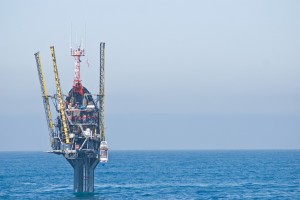Bristol subsea design firm DEEP, which is developing what it calls the next generation of ‘underwater human habitats’, has saved a pioneering ocean-going research vessel from being scrapped in a last-minute rescue mission.
Bosses at the firm learned about the plight of the R/P FLIP (Floating Instrument Platform), pictured, just days before it was due to be broken up off the coast of Mexico – and immediately stepped in to save it. 
The 108m-long vessel, which was operated for more than half a century by the US Navy, was known for its remarkable design that gave it the ability to ‘flip’ from a horizontal position to a vertical one.
As a result, it was stable even in the most tempestuous seas, making it possible to study oceanographic phenomena such as sound propagation, wave dynamics and marine life, in open water.
Originally commissioned in 1962, FLIP played a crucial role in advancing scientific understanding of the ocean, particularly in acoustics and hydrodynamics.
Its contributions to oceanography remain highly significant, having enabled decades of groundbreaking research in marine science.
Decommissioned last year by the US Navy’s Office of Naval Research and the Scripps Institution of Oceanography, the platform was towed to Mexico to be scrapped.
Word of FLIP’s impending destruction reached Avonmouth-based DEEP and within 48 hours a team had been scrambled to intercept the vessel before it was destroyed.
Now, months later, the rescued platform has made its way from Mexico, through the Panama Canal, across the Atlantic, into the Mediterranean and on to France, where over the next 12 to 18 months it will be refitted and modernised.
DEEP CEO Kristen Tertoole said: “FLIP is an iconic research platform – anyone in the maritime research or engineering communities knows about her and many have a war story or two.
“We’re incredibly proud to confirm FLIP’s arrival in European waters. FLIP is from a time of bold engineering and optimism for our future and our oceans, an ethos DEEP shares and seeks to embody.
“Our mission is perhaps equally bold: to make humans aquatic by enabling our species to live, work and thrive underwater.”
She said FLIP would now play a key role in the DEEP fleet, providing a one-of-a-kind platform for ocean research and being capable of supporting DEEP’s Sentinel habitat deployments as part of the firm’s extended research network.
“We look forward to announcing her relaunch in early 2026, and I’m thrilled to confirm that many oceanographic and research groups are already in contact to ensure access.”
FLIP’s refit is to take place at MB92, a renowned shipyard with facilities in Barcelona and La Ciotat, near Marseille.
Dr Tom Drake, Office of Naval Research, said: “I’m delighted by DEEP’s decision to revitalize and modernize the R/P FLIP, a unique research platform that has served the ONR exceptionally well for years.
“This modernisation initiative will significantly expand her capabilities in ocean science, observation, and exploration, breathing new life into a vessel that has been vital to our mission.
“We look forward to working closely with DEEP to continue the US Navy’s proud tradition of excellence in the operation of FLIP.”
An international design and engineering organisation, DEEP has a vision is to, in its words, make humans aquatic.
It believes the greatest long-term threat to the oceans, which represent more than 99% of the three-dimensional habitat of Earth, is not plastic, shipping or pollution but ignorance.
The keystone of DEEP’s answer is the Sentinel habitat platform, a patent-pending system of standardised components that can be assembled and deployed in an infinite number of configurations up to 200m of depth and anywhere on the planet’s continental shelf.





























